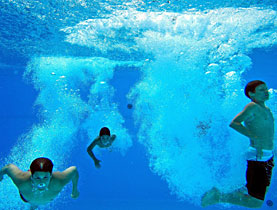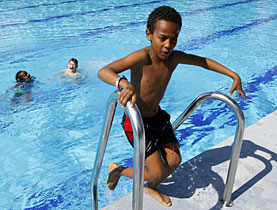Urine-filled pools to be cleaned up

Up to half of Swiss public pools contain excessive amounts of urine, faeces, sweat and germs.
The good news however is that while water quality often leaves something to be desired, the health of swimmers is not at risk – and the government now wants to clean things up.
It wants to introduce a limit to the presence of urea – the main nitrogen-containing substance in urine – of 3mg per litre of water.
Last year canton Zurich said 27 per cent of its pools did not pass muster. During 2003’s “summer of the century” the figure jumped to 50 per cent.
In canton Graubünden, fault was found with 43 per cent of pool water samples. Often the level of chlorine was too high.
This has brought tears to the government’s eyes and it now intends to end the confusion around checking the country’s pools – which is currently left to the 26 cantons – by standardising quality control.
“This is a good idea because until now pool law hasn’t been regulated at a federal level,” Irina Nüesch, responsible for drinking and pool water at the consumer protection office in canton Aargau, told swissinfo.ch.
“The parameters are not standardised: the method, frequency and cost of controls differ from one canton to another.”
The country’s cantonal chemists have been calling for harmonised pool controls for a long time and on Tuesday welcomed the government’s decision. But they added that swimmers were in no danger.
“At the moment pool water is actually good quality,” Claude Ramseier, who heads the drinking water and pool water section of the cantonal chemists’ association, told swissinfo.ch.
“Sure there are a few exceptions as always and there are some not-so-nice things in the water such as urea, but people shouldn’t be worried.”
Shower more
The government also intends to incorporate pool water into the federal food law, which came into force 100 years ago this month.
The revised law, which is currently being discussed by the cantons, doesn’t mean pool water should be fit to drink but rather that the importance given to the subject by the government would put pressure on pool owners to clean up their act and ensure standards are met.
Ramseier added that more fresh water should be pumped into pools – 30 litres per swimmer per day – but because this lowers the pool temperature and means more chemicals must be added, many pools don’t do this.
He also said the onus wasn’t only on the authorities.
“We can see that people have inhibitions about showering [before going into the pool] and that’s to do with the fact that some showers are connected to cold water. We have called for these showers to be heated so more people shower,” he said.
“Also, parents should show more discipline with their young children – making them go to the loo before they jump in the water.”
Not a health hazard
Nüesch says improving the lavatories in public pools could also help, but points out that urea itself is not a problem.
“Urea is a harmless substance, but when it reacts with chlorine it can produce trichloramine substances. In outdoor pools this is less of a problem because the volatile parts are simply blown away,” she said.
“It’s less dramatic for eyes and ears than when an indoor pool is poorly managed.”
A high level of trichloramine hanging in the air at indoor pools can cause eye and respiratory irritation because it is a strong irritant to mucous membranes. For this reason ventilation is very important for chlorinated pools.
Rolf Etter from the cantonal chemists’ association said people could go for a dip in Switzerland without worrying. He warned however that “to go to a public pool is to share water with people for whom hygiene is not necessarily a priority”.
To judge whether pool water is clean, many pools refer to norms set by the association of engineers and architects (SIA), which are under review.
There is no tolerance level for urea in Swiss pools, but the SIA wants to introduce a tolerance level of three milligrams of urea per litre – more than this and the pool would have to take measures.
This is not because urea is bad for one’s health per se – on the contrary, it keeps one’s skin moist – but urea reacts with chlorine to produce chloramines, which can cause eye and respiratory irritation.
The SIA also wants to lower the maximum level of chlorine from 0.8 milligrams per litre to 0.6.
An Olympic-sized swimming pool contains 2,500,000 litres of water.
According to the European Association of Urology, people produce between 0.8 and 2 litres of urine within 24 hours.
Of that, the normal value of urea per litre is 600-900 milligrams.
Based on a tolerance of 3mg of urea per litre of pool water, swissinfo.ch calculated that more than 7,000 people would have to urinate in the pool for 24 hours to breach this limit.
That sounds high, but the urine content would be only 0.4%.

In compliance with the JTI standards
More: SWI swissinfo.ch certified by the Journalism Trust Initiative











You can find an overview of ongoing debates with our journalists here . Please join us!
If you want to start a conversation about a topic raised in this article or want to report factual errors, email us at english@swissinfo.ch.